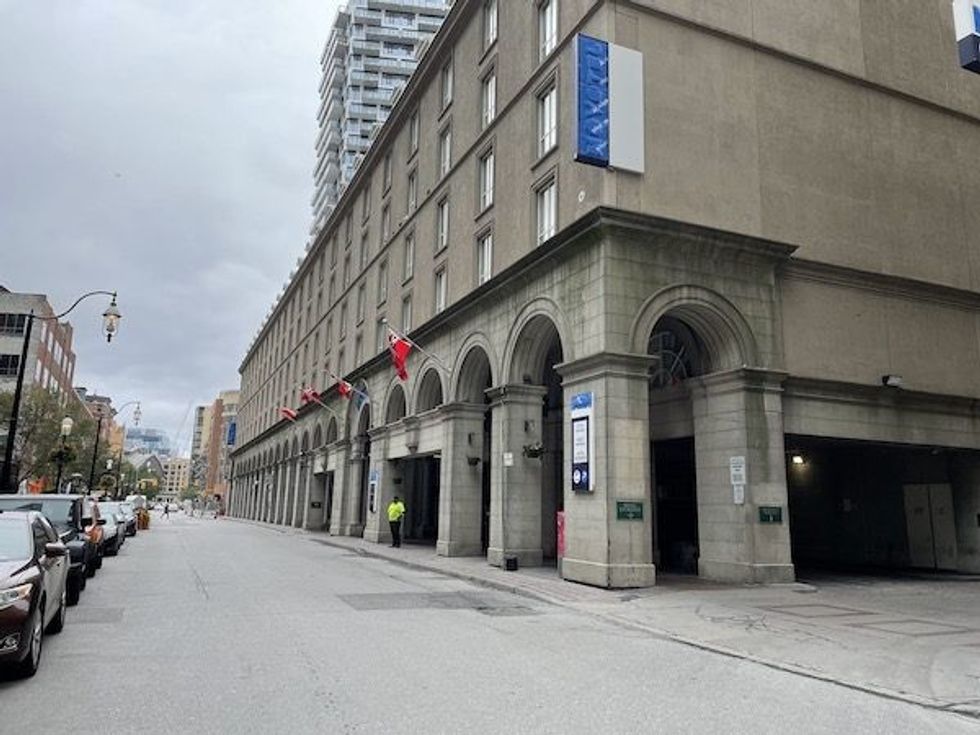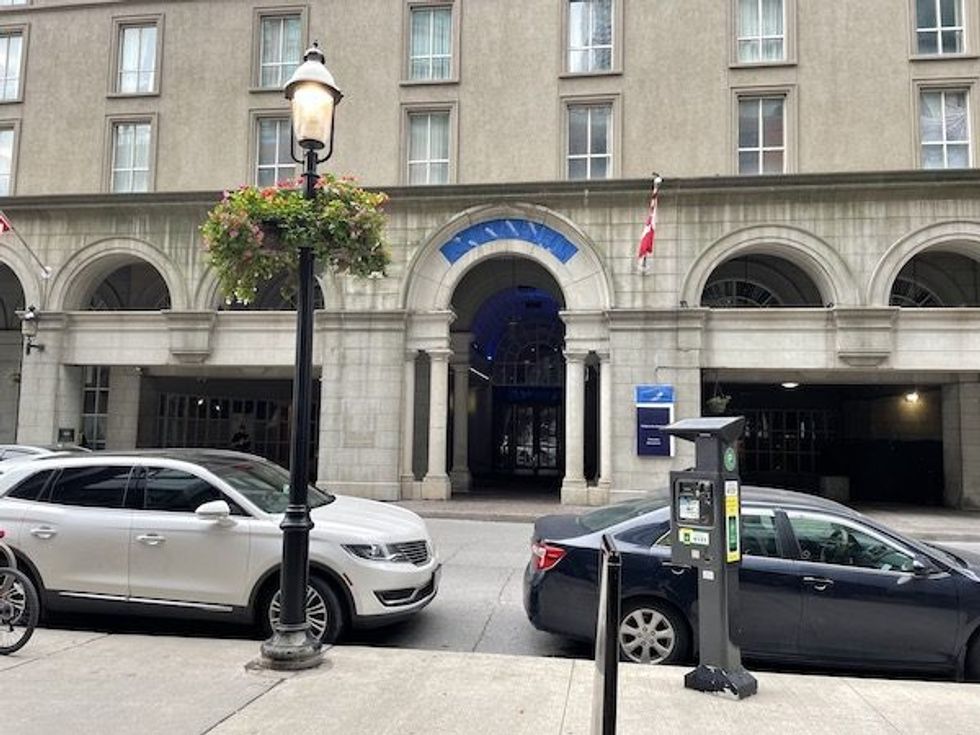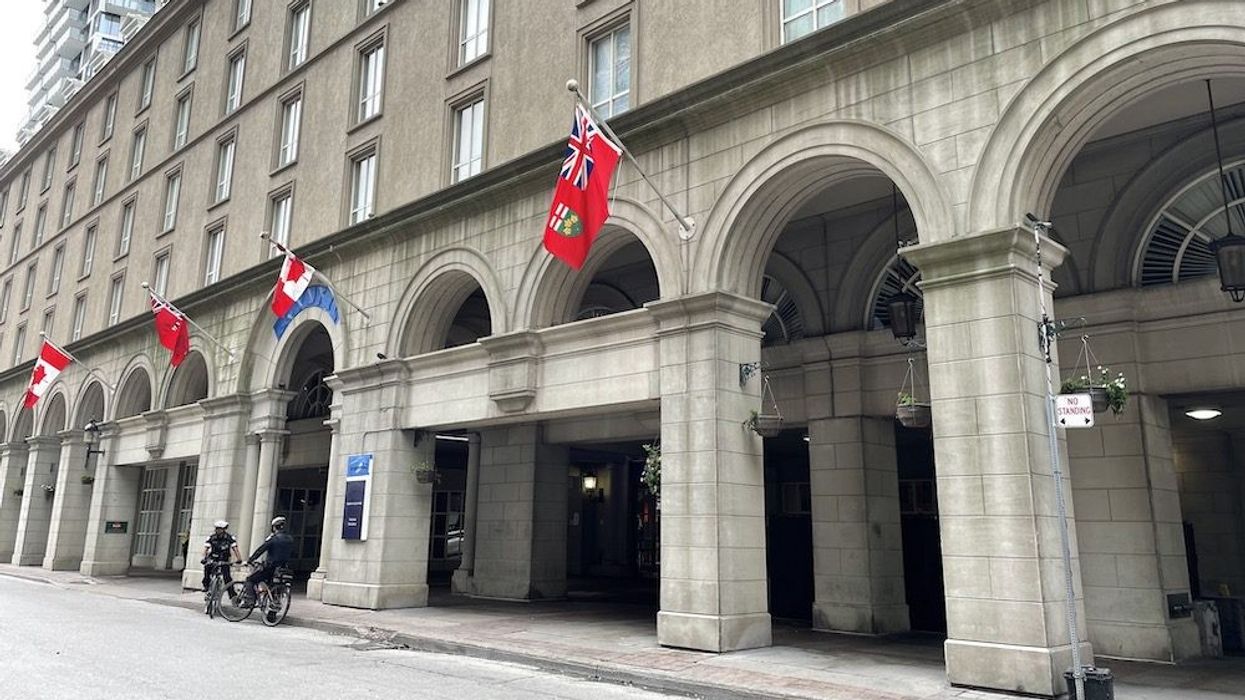Residents who’ve become neighbours with the some 200-plus homeless clients in the 45 The Esplanade shelter -- formerly the Novotel Toronto Centre (AKA “The Novotel Hotel”) -- have had enough.
They’ve had enough of the violence, human excrement, discarded needles, ear-piercing chaos, and general debauchery that now characterizes the once booming and vibrant five-minute neighbourhood. And they simply don't want to endure it for another year.
In response to the pandemic-inspired social distancing measures in existing City of Toronto shelters, the Novotel was leased by the City and 45 The Esplanade shelter opened its doors in February 2021. Neighbourhood residents and business owners say it’s been nothing short of a nightmare ever since. And one they now may not wake up from any time soon.
The lease on the property was initially set to expire in December 2021, but -- pointing to pandemic concerns -- the City extended it to April 30, 2022. Now, there’s been yet another extension of the shelter approved. City staff recently proposed to extend the lease to December, then to the end of April 2023 if necessary (and it will likely be deemed necessary).
The item was considered by the City’s Economic and Community Development Committee on March 24, 2022 and was adopted with amendments. Its adoption came despite many loud and clear voices showing up and presenting sound arguments against it. Then, on Wednesday, Toronto City Council unanimously approved the extension of Toronto's temporary shelter leases, including 45 The Esplanade.
"With council approval of the recommendations put forward in the 'COVID-19 Shelter Transition and Relocation Plan Update' report, staff are authorized to extend the lease agreement at 45 The Esplanade to April 2023, if required," reads a statement to STOREYS from the City.

"It Feels Like Skid Row"
Neighbourhood residents I’ve spoken to personally (who don't want to be named publicly) feel “gaslit” by the constant lease extensions. "This used to be one of the best neighbourhoods in the city to live and work for young professionals," said one resident. "Now, I'm afraid to walk my dog on the streets after dark; it feels like Skid Row."
In a viral video that made its way through social media channels last year, one local condo resident voiced the sentiment of many others, when she outlined the utter chaos that’s ensued on city streets. Similarly, in handfuls of Reddit forums, area residents highlight the constant drug use and overdoses, daily 911 calls, violence, and aggressive accosting that are direct byproducts of the shelter.
READ: Bedbugs, Drug Abuse, and Child Neglect: Living in Hell at Toronto's Lido Motel
“Safety to the public is paramount; the massive dollar amounts being spent are concerning. Tourism is being impacted. Our general levels of safety for businesses and residents in the areas are in rapid decline. Still, the city doesn't listen. They need to be reminded that they work for us,” reads an April 4th email from the London on the Esplanade (LOTE) condo management to its residents -- one of many that they've sent out as of late. The condo’s two residential buildings sit directly across from, and around the corner from, the shelter, respectfully.
The shelter also sits across from one of the city’s most patio-centric and tourist-filled streets. With its wide and extended sidewalks and dining options like The Keg, Bier Markt, The Old Spaghetti Factory (a longtime favourite for families from across the city), and multiple sports bars, the strip has been a hotbed for Toronto visitors pre or post-sporting event, concert, or visit to the nearby St. Lawrence Market. And, judging from their comments in community meetings since the arrival of the shelter, business owners aren't thrilled either. Diners are constantly accosted on the patios in the warmer months; restaurants are vandalized regularly; and dinner now comes with a show, thanks to constant screaming and fighting across the street.
A Larger, Systemic Problem
To be clear, the St. Lawrence Market neighbourhood has always been a mixed-income neighbourhood, one characterized by a harmonious balance of co-op housing and glassy new condo buildings -- some housing multi-million dollar penthouse units. But, after keeping an open mind for some time, residents are losing their patience with the unrest brought with the shelter. This isn’t what the signed up for; nor what they’re dropping countless dollars in housing costs to endure, they say.

The police presence that was amped up in the fall seems to have dwindled from the neighbourhood, based on personal observation. At the same time, as the weather warms, the disruption and rampant drug use on the streets seems to have amped right back up again.
Before she moved in to the new condos at 75 The Esplanade, a neighbourhood resident named Holly had heard the horror stories about the temporary shelter next door. “There was a lot of hearsay about the troubled state of the neighbourhood,” she says. As a result, she hasn’t been too shocked with what she’s seen in the two months since she moved in. “Someone had told me that the chaos and out-in-the-open drug use really comes in waves; that it's more noticeable at the end of the month, when government subsidy cheques come in,” she said. “I can confirm I have noticed this.”
Of course, this points to a larger systemic problem of rampant addiction and mental health issues among the city's homeless population. Many of the shelter clients are indeed under the influence of serious drugs, as clearly evidenced by their erratic behaviour, discarded needles, and overdoses seen on the surrounding streets. Holly also says she often gets inquiries from “anxious” real estate agents in the elevator who are worried about the impact of the shelter on prospective residents.
For weeks, the LOTE condo management team has been encouraging its residents to contact City Council to express their opposition to the extension of the lease. “Just state that you strongly oppose this proposal because you have personally been subjected to loss of your own health, safety, and property and/or business over the past two years as a result of the heavy concentration of these hotels in your community. Any extension of this will be intolerable and against your rights to safety. The concentration of temporary hotels in one small area has not benefitted either the homeless, who have also been subjected to predatory behaviour at these hotels, or the neighbourhoods," reads an email from LOTE.
The management team does acknowledge that Toronto’s homeless continue to sleep over grates and in tents on the streets, so the proposal doesn’t solve the problem. “Further, housing without being contingent on change in behaviour has not been proven to be successful in any other North American city where this has been tried before,” reads the email. It states that the only person who seemingly benefits from the situation is the owners of the hotel, when many other businesses could have benefitted from taxpayer dollars during the pandemic. It's a fair point.
“The community has been tolerant during COVID, but the residents and businesses were promised it would not go this long. There is no more pandemic. The way the proposal is written is manipulative (i.e. only until December). Then in December, they will say it is too cold so need to extend until the Spring, etc., etc. We have heard this for two years. ENOUGH! It is time for them to go into the permanent shelters and for hotels to start welcoming tourists and business clients once again,” reads the email. It should be noted, however, that this email was sent before the onset of the “sixth wave” in the city.
Pandemic or not, however, the sentiment remains the same: residents want their once safe and peaceful streets back.
As for the future of the property, it looks like it won’t return as a bustling hotel once its homeless occupants finally pack up and leave. According to a development application submitted to the City in early January, there are eventual plans to replace the eight-storey building with two 36-storey mixed-use buildings.
So, the local residents will have to decide what’s worse; constant disrupt and chaos or perpetual construction. And, if I was a betting woman, I'd say they'll choose the latter.





















